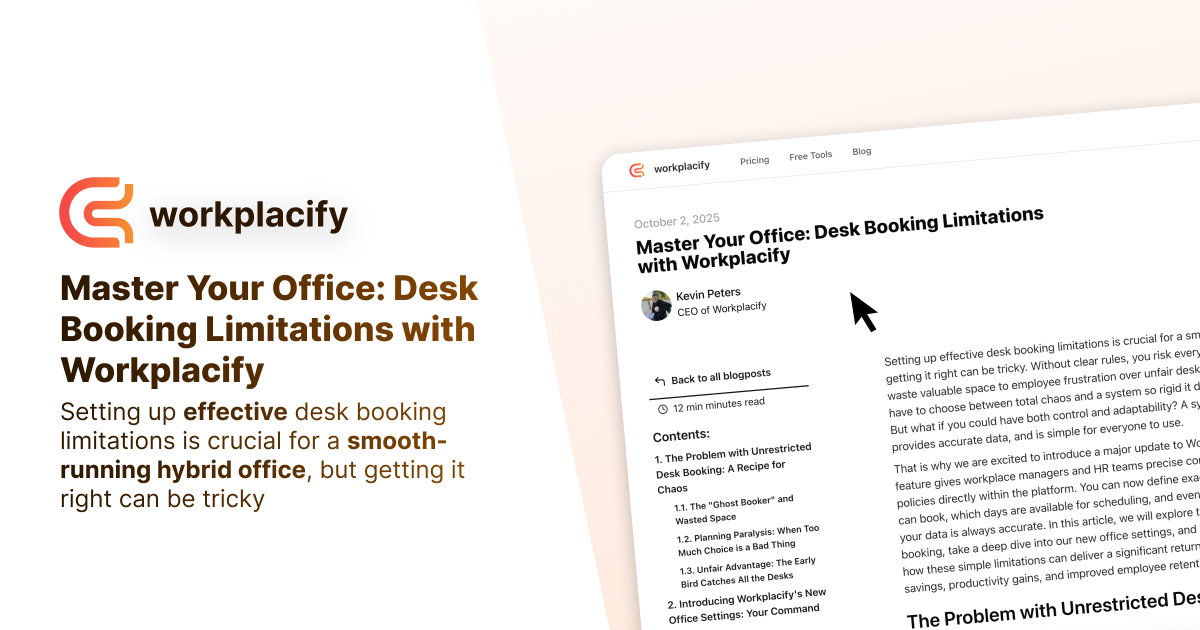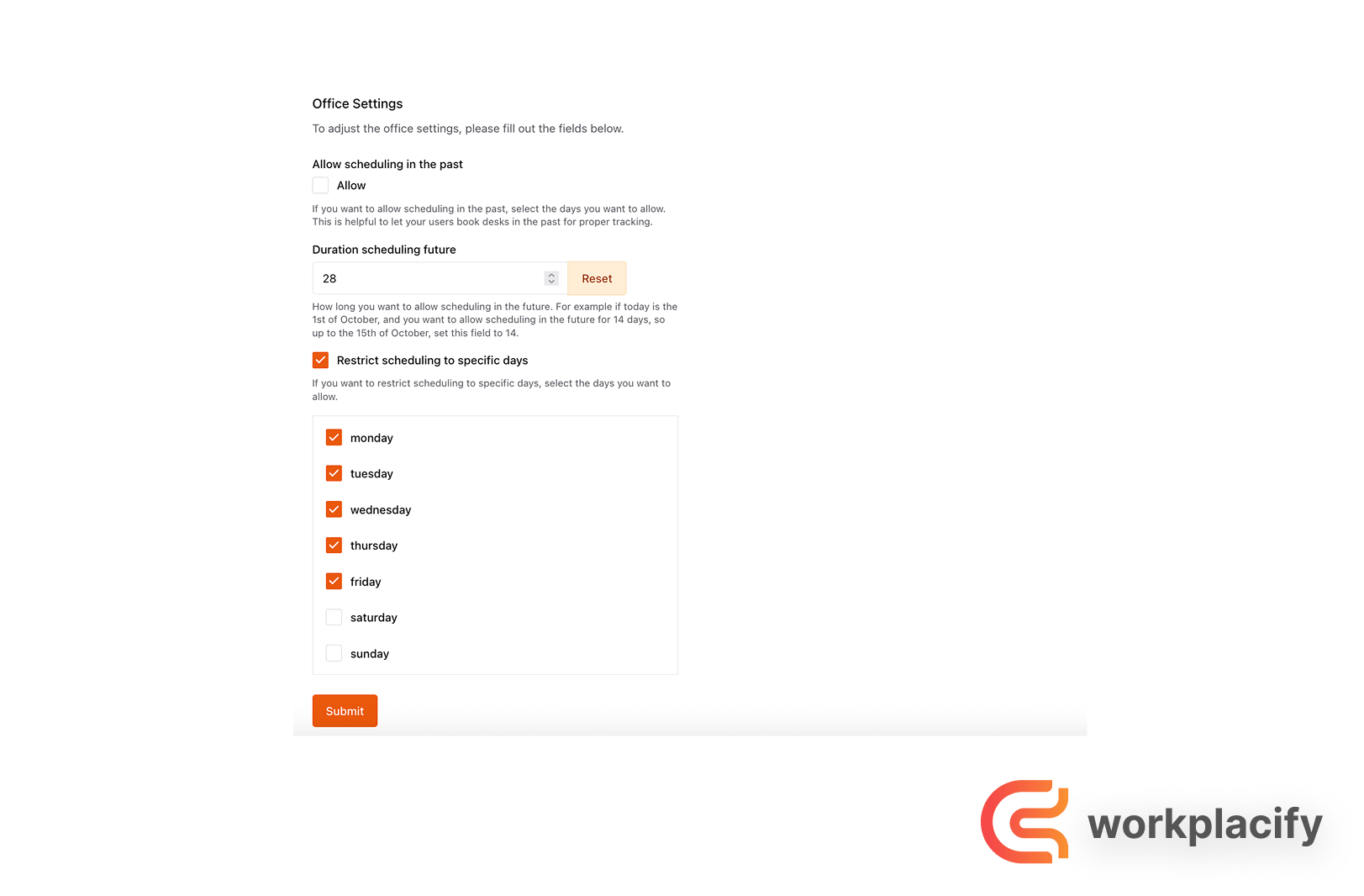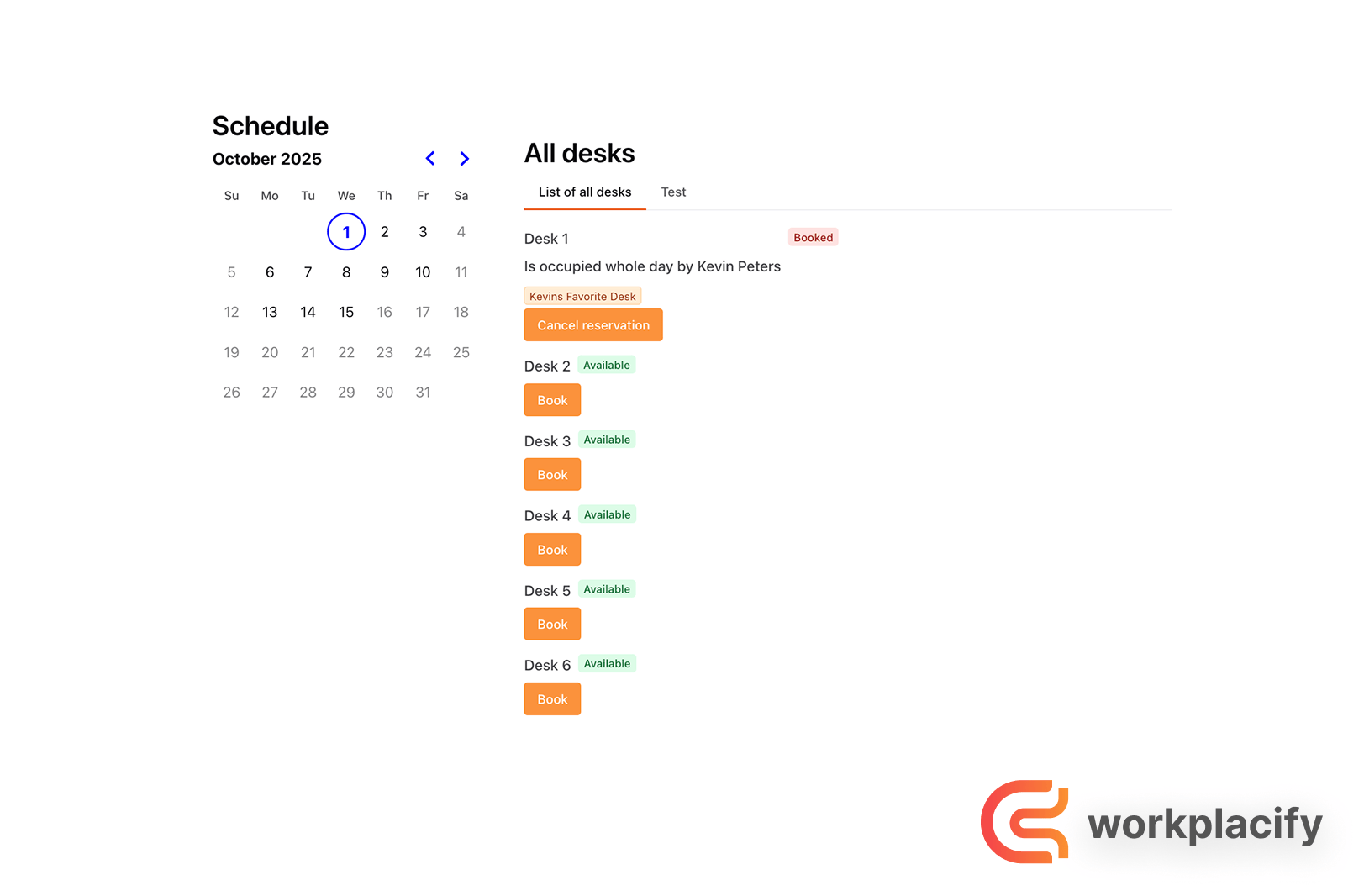workplacify
Create professional hybrid workplace policies
Calculate potential savings from optimizing desk usage
Create professional visitor badges with QR codes
October 2, 2025
Master Your Office: Desk Booking Limitations with Workplacify

Kevin Peters
CEO of Workplacify

Setting up effective desk booking limitations is crucial for a smooth-running hybrid office, but getting it right can be tricky. Without clear rules, you risk everything from "ghost bookings" that waste valuable space to employee frustration over unfair desk availability. It often feels like you have to choose between total chaos and a system so rigid it defeats the purpose of flexibility. But what if you could have both control and adaptability? A system that enforces fairness, provides accurate data, and is simple for everyone to use.
That is why we are excited to introduce a major update to Workplacify: Office Settings. This new feature gives workplace managers and HR teams precise control over their desk scheduling policies directly within the platform. You can now define exactly how far in advance your team can book, which days are available for scheduling, and even allow for past entries to ensure your data is always accurate. In this article, we will explore the problems with unrestricted booking, take a deep dive into our new office settings, and build a clear business case showing how these simple limitations can deliver a significant return on investment through real estate savings, productivity gains, and improved employee retention.
The Problem with Unrestricted Desk Booking: A Recipe for Chaos
An open-for-all desk booking system sounds great in theory but often creates practical problems in a dynamic workplace. When employees can book any desk, anytime, with no restrictions, inefficiencies and frustrations quickly appear. This lack of structure can undermine the very goals of your hybrid work policy.
The "Ghost Booker" and Wasted Space
We have all seen it: a desk is marked as reserved for the entire day, but it sits empty. This is the work of a "ghost booker." An employee might book a desk "just in case" they come in, or reserve their favorite spot for the entire month, even if they only plan to use it a few times. Without desk booking limitations, this behavior runs rampant. According to research from CBRE, office utilization often hovers around 60%, meaning a significant portion of space is already underused. Ghost bookings exacerbate this problem, creating artificial scarcity and driving up real estate costs for space that is not actually being used.
Planning Paralysis: When Too Much Choice is a Bad Thing
Having the ability to book a desk six months from now might seem like a benefit, but it can lead to decision fatigue and logistical headaches. Plans change. A project gets moved, a meeting is canceled, or an employee decides to work from home. When the booking calendar is a free-for-all, it becomes cluttered with tentative reservations that may never materialize, making it difficult for others to find a spot when they genuinely need one. This forces employees to spend more time managing their schedules and less time on productive work.
Unfair Advantage: The Early Bird Catches All the Desks
In a system with no booking window, a few hyper-organized employees can claim all the best desks—the ones by the window or in a quiet corner—weeks or months in advance. This leaves the rest of the team scrambling for leftover spots, fostering a sense of unfairness and competition. A positive workplace experience is built on equity. When your booking system feels like a race, it can quickly damage morale and make employees feel undervalued, which is a major factor in employee turnover.
Introducing Workplacify's New Office Settings: Your Command Center
To solve these exact problems, we have built the new Office Settings feature directly into Workplacify. It is a simple, powerful control panel that lets you define the rules of engagement for your office space, ensuring the system is fair, efficient, and aligned with your company's unique policies.
What are Office Settings? A Quick Overview
The Office Settings page is your new command center for scheduling rules. Here, you can implement key desk booking limitations with just a few clicks. You no longer need to rely on honor systems or manual oversight.

As you can see, the settings are straightforward:
Duration Scheduling Future: Control how many days into the future employees can book a desk.
Restrict Scheduling to Specific Days: Select only the days of the week your office is open for bookings.
Allow Scheduling in the Past: Enable users to log desk usage after the fact for 100% accurate reporting.
Why This Matters for Workplace Managers and HR
For workplace managers, these settings mean less time spent manually managing conflicts and more time focusing on strategic initiatives. You can set the policy once and trust the system to enforce it. For HR professionals, it is a tool to promote a fair and equitable workplace culture. By ensuring everyone has a reasonable chance to book a good spot, you contribute to a positive employee experience, which is directly linked to higher retention rates. A well-managed desk booking system is a critical component of a successful hybrid work model.
A Deep Dive into Desk Booking Limitations
Let us look at how each of these new office settings works and how you can use them to create a more organized and efficient workplace.
Setting the Future: The 'Duration Scheduling Future' Setting
This is perhaps the most impactful limitation you can set. It defines the booking window for your entire organization. For example, setting this to "14" means an employee can book a desk up to 14 days in advance, but no further.

Finding Your Sweet Spot: 7, 14, or 30 Days?
The ideal booking window depends on your company culture and workflow.
7 Days: A short window is great for highly agile teams whose plans change weekly. It promotes spontaneous collaboration and ensures the schedule reflects near-term reality.
14 Days: This is a popular choice. It provides enough time for employees to plan their weeks without allowing for the long-term "hoarding" of popular desks. It strikes a good balance between planning and flexibility.
30 Days: A longer window may be suitable for companies where employees have more fixed schedules or need to plan travel to the office a month in advance.
By setting a reasonable window, you level the playing field and drastically reduce ghost bookings.
Keeping it Current: The 'Restrict Scheduling to Specific Days' Setting
Does your company have a 4-day work week? Is the office closed on Fridays for deep work from home? This setting allows you to align your digital booking system with your physical office reality.
Aligning Your Digital Office with Your Physical One
Simply uncheck the days your office is closed (like Saturday and Sunday), and those dates will become unbookable on the schedule. This prevents accidental bookings on days when no one will be in the office, reducing confusion for employees and keeping your utilization data clean. It is a simple way to enforce your company's hybrid work policy without constant reminders.
The Power of Hindsight: 'Allow Scheduling in the Past'
This setting might seem counterintuitive, but it is a powerful tool for data accuracy. We know people are busy. Someone might come into the office, grab an empty desk, and forget to book it.
Why Accurate Historical Data is Your Secret Weapon
By allowing scheduling in the past (e.g., for the previous day), you empower employees to correct the record. They can log their desk usage after the fact, ensuring it is captured in the system. Why does this matter? Because your workplace analytics are only as good as your data. This feature helps you get to 100% accuracy, which is essential when making big-ticket decisions about your real estate portfolio. It transforms your booking system from just a scheduling tool into a robust data collection platform. If you are struggling with getting started, our moving away from office spreadsheets can provide more context.
Building the Business Case: The ROI of Smart Desk Booking Limitations
Implementing desk booking limitations is not just about creating a tidy schedule; it is about driving real business results. The controls within Workplacify's Office Settings directly impact your bottom line.
See Office Settings in Action
Ready to take control of your workspace? Schedule a personalized demo to see how Workplacify's new desk booking limitations can optimize your office and save you money.
Calculating Real Estate Savings Through Accurate Data
Commercial real estate is one of the largest expenses for most companies. Making decisions about office space without accurate data is a massive financial risk.
The Problem: Ghost bookings and unrecorded desk usage skew your perception of office needs. You might think you need more space when you are actually just using your current space inefficiently.
The Solution: By using the "Duration Scheduling Future" setting to reduce ghost bookings and the "Allow Scheduling in the Past" setting to capture all activity, you get a crystal-clear picture of your actual desk utilization.
The ROI: This accurate data, as highlighted by workplace analytics firm XY Sense, is critical for "right-sizing" your real estate portfolio. Armed with reliable reports, you can confidently make decisions to consolidate floors, sublease excess space, or avoid costly expansions, leading to hundreds of thousands of dollars in savings.
Boosting Productivity by Reducing Uncertainty
Every minute an employee spends trying to find a place to work or navigating a confusing booking system is a minute they are not spending on their core responsibilities.
Smart Desk Booking Rules
Reduced Cognitive Load
Clear rules mean less time spent planning and worrying about finding a desk
Faster Onboarding
New hires can quickly understand the straightforward booking process
Focus on Work
Employees arrive knowing a desk is waiting, allowing them to be productive immediately
Unrestricted Booking
Decision Fatigue
Endless choices and a cluttered schedule create unnecessary mental stress
Time Wasted
Employees spend valuable time searching for desks and managing long-term bookings
Onboarding Confusion
Complicated or nonexistent rules make it hard for new employees to get started
The Problem: An unrestricted system creates uncertainty and planning overhead.
The Solution: Simple, clear desk booking limitations create a predictable and stress-free experience. Employees know the rules, trust the system is fair, and can book their space in seconds.
The ROI: A study from Gallup found that engaged, productive employees are a key driver of profitability. By removing a daily point of friction, you give time back to your employees, reduce their cognitive load, and empower them to focus on high-value work, directly contributing to overall business productivity. For more ideas on improving the office, see our post on how to improve office occupancy.
Improving Employee Retention with a Fairer System
The modern employee expects a flexible, fair, and positive workplace experience. A poorly managed hot-desking system can be a major source of frustration and a reason for people to look elsewhere.
The Problem: When a few people always get the "best" desks, it creates a culture of "haves" and "have-nots," leading to resentment.
The Solution: A limited booking window ensures that everyone has a fair chance to book a desirable desk. It democratizes access to office resources.
The ROI: According to Gartner, employee retention is a top priority for CEOs. Creating a fair and equitable environment is a low-cost, high-impact way to improve employee satisfaction. By using office settings to build a better booking experience, you show your employees that you value their time and well-being, which is a powerful factor in retaining top talent. This aligns perfectly with creating a strong hybrid workplace policy.
Quick Takeaways
Unrestricted booking causes problems: It leads to wasted space from "ghost bookings," employee frustration from unfairness, and planning difficulties.
Workplacify's new Office Settings give you control: Easily set rules for how far in the future desks can be booked and on which days.
A limited booking window is key: Setting a future booking limit (e.g., 14 days) prevents desk hoarding and ensures fair access for everyone.
Align your digital and physical office: Restrict bookings to specific days to match your company's work week (e.g., Monday-Thursday).
Data accuracy is a superpower: Allowing past bookings helps you capture 100% of desk usage, leading to better real estate decisions.
Limitations deliver real ROI: Smart rules lead to direct cost savings on real estate, improved employee productivity, and higher retention rates.
Frequently Asked Questions (FAQs)
Take Control of Your Workspace Today
A well-organized office is a productive office. With Workplacify's new Office Settings feature, you have the power to create a fair, efficient, and data-driven desk booking system that works for everyone. Stop letting scheduling chaos dictate your workplace experience. It is time to implement smart desk booking limitations that save money, boost productivity, and keep your employees happy.
Ready to see it for yourself? Sign up for Workplacify for free or book a personalized demo with our team today.
workplacify
© 2026 workplacify. All rights reserved